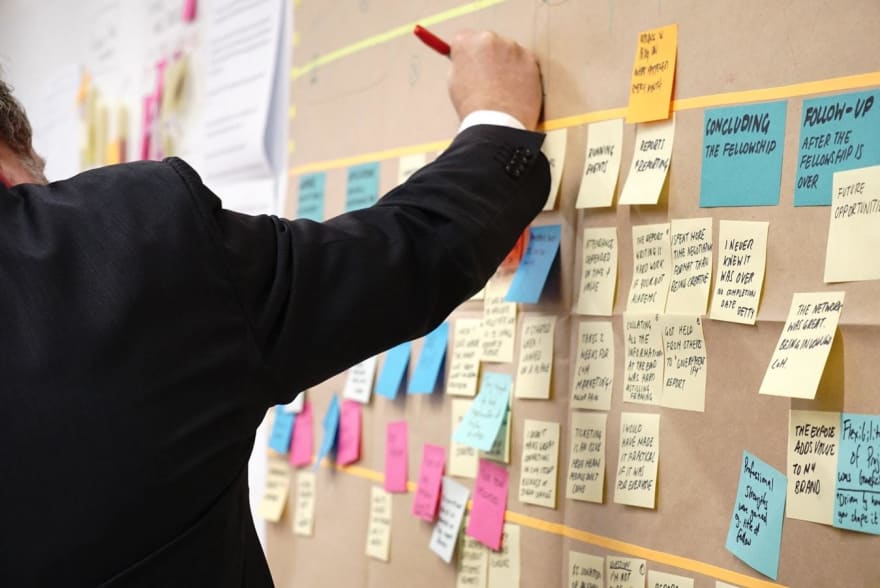When it comes to running a project, you have no other option but to get ready for thousands of meetings with stakeholders and team members. Those meetings are absolutely necessary in order to align goals, set deadlines and discuss progress, status and issues. Yes, those weekly or even daily meetings are important, however the project kickoff meeting has to be considered as the most important one.
During your project kickoff meeting presentation, you will have the opportunity to set the tone and the vision for the entire project’s future. Not just that but you will clearly establish expectations and gather all the information needed before officially starting the project. A kickoff meeting will provide information to all the parties involved in the upcoming project. Last but not least, if done right, you will end up with a motivated, focused and excited team who are ready to work hard and succeed.
In the following article, I will dive deeper into the concept, importance and purpose of the project kickoff meeting. Not just that but I will also talk about utilizing kickoff meeting agenda to further secure a triumphant gathering for a great new project. Let’s go!
What is a project kickoff meeting?
To put it simply, a kickoff meeting is the first meeting between the stakeholders and the project team. The meeting serves as an opportunity to synchronize and discuss the project’s objectives, the client’s requirements, orient the team and communicate every little detail that will guide the project to future success.
The project manager is usually the one responsible for running the meeting. Such meetings are usually held as soon as the contracts have been signed and all parties have agreed on a budget and timeline. If a project is very large and it requires several phases, a kickoff meeting can be held at the beginning of every new phase.
What’s the purpose of a kickoff meeting?
A Kickoff meeting serves the following purpose:
- Notify all the project stakeholders that the project is starting.
- Introduce team members.
- Clarify the project requirements and background.
- Dedicate individual responsibilities.
- Set project milestones.
- Build a roadmap with the team and stakeholders.
- Make sure there are realistic expectations.
- Acknowledge potential surprises and problems the team might encounter.
- Encourage conversation and answer questions together to clear any confusion or mismanaged expectations.
- To prevent project setbacks by eliminating surprises.
Ultimately, the purpose of a project kickoff meeting is to lay a solid foundation for a successful upcoming project. It’s a good chance to bring everyone on the same page and set ground rules that will result in working together more effectively.
All that must sound quite simple and many might prefer to send a detailed email or a presentation that explains everything in written form. However, trust me, this is absolutely not the type of meeting you should have in the digital world. Any other update or weekly team meeting might be converted into an email or even postponed but the project kickoff meeting should definitely be held and it should be held in person. With the right preparation, your project will run smoothly and you won’t be surprised by any issues or uncalculated gaps.
How to prepare for a kickoff meeting?
Just like any other meeting, a project kickoff meeting requires preparation if you want it to be a successful one. Whether the project meeting is for internal or external stakeholders, check out the following tips you might want to consider to get the most out of your next project kickoff meeting.
Schedule the meeting in advance and make sure attendees can dedicate at least an hour of their time. Set aside a chunk of time to allow yourself and everyone else involved in the project to review all the details and ask relevant questions. An hour-long meeting is considered a suitable length. However, it all depends on the project complexity and the organization.
Make sure you are inviting the right people. Gather everyone who is going to play a role, whether big or small, to the project meeting. If there are employees who are working remotely, make sure your meeting will be accessible online. You can utilize meeting management software like Mombit to help you with that.
Agenda is king! This is the most important part of your preparation for an upcoming project kickoff meeting. Your agenda is your meeting guide. By preparing one, you have a structure to walk on to and utilize every single minute of that one-hour meeting. You can’t have an efficient or productive meeting without an agenda. Stay tuned to find out how to prepare a kickoff meeting agenda.
Taking notes during the meeting is crucial. Many project managers forget about that rule or just assume that they don’t need to write things down as they will remember things later. Well, based on experience, you must absolutely take notes. Be prepared for project-specific developments or questions that will arise during the meeting. One way to make sure all changes will be addressed and all information will be checked and added to the project map, is to rely on notes. If you don’t like the old-fashioned way, you can always use note-taking apps. Or, you can always assign a designated note-taker who will be in charge of all that. By doing so, you can focus on the presentation and its proper delivery to the attendees.
How to Write an Effective Kickoff meeting agenda
As mentioned before, you should consider a kickoff meeting template to coordinate efforts and make sure all the primary topics are covered. You will most likely host a lot of follow-up meetings after the initial project kickoff meeting so you have to make a habit out of utilizing a flexible agenda. Having a flexible kickoff meeting template or a regular team meeting template will eliminate the need to recreate the project meeting wheel each time you have to introduce a new project. Not just that but it will add a methodical consistency to your working process across various company projects.
A kickoff meeting agenda will also build confidence in the clients that your team is absolutely capable of completing the project successfully. So, what to include in a kickoff meeting agenda?
Introductions
The chances of having team members who have not worked together before are quite high. You have to dedicate a minute or two to get to know each other on a personal level. This acts as an icebreaker and will definitely ease the tension in the room. To run a better meeting, a relaxed atmosphere is needed. Promote mutual respect as you say a few words about each one of your team members and why you chose them to work with you on this project.
Project Background
During this part of the agenda, you can offer a high-level overview of the project. You can present a brief history of the project, how you got to work on this project, the business case, meetings or ideas that led to the development stage and more. Whether your stakeholders are internal or external, background information is necessary to set the stage. You have to make sure everyone in the room knows why this project is happening and how it is going to happen.
A quick note - don’t turn this part of the agenda into a lengthy history lesson filled with overwhelming details. Be as quick and as straightforward as you can.
What is the goal of the project
What is the big picture? How will your project influence people’s lives and how it will meet their needs? These are all things you should do your best to explain during this part of your meeting agenda. Make sure everyone will understand the purpose behind the project and will feel good about making a difference.
Prepare a project mission statement but don’t forget to keep it short and inspiring. If your stakeholder already has a mission statement, integrate it in the kickoff meeting agenda. What you’re trying to do is motivate your team and give them a sense of purpose. Ultimately, what you’re trying to convey is that short-term toil is sometimes the cost for long-lasting impact which will encourage them to give their all and even understand that there might even be days when they may need to pull longer hours. They will be ready to do so, as long as the project has a clear mission and you explain it to them.
Scope
This part of your agenda will cover all the details of the project. Here, you have to explain the statement of work and project deliverables so that everyone will understand their roles and responsibilities for the successful outcome of the project.
Talk about the project scope. The project scope should contain key features and functionalities and is where all parties agree upon a statement of the work. Your scope should also include an outline description and any possible constraints, such as budget or timeline.
It’s also a great time to assess whether the goals you’ve set are realistic and achievable within those constraints you’ve just mentioned.
In time, the project will most likely evolve. However, you have to manage everyone’s expectations and talk about potential risks early on in its development so that you can more easily manage issues and problems when they arise. Try to achieve the necessary balance between the wants and the needs of the stakeholders and the reality of the project, considering deadliness, complexity, budget and other similar factors.
Plan and tools
This part of the agenda includes a roadmap, a tailored timeline specific to the project, as well as project management tools, software and methodologies the team will follow. Also, here you can mention which communication tool you will use to coordinate work internally and externally. Here, you will also deal with change requests or objections, if any.
Roles
You’ve already touched upon project expectations so your team is aware of how they will fit into the picture. So, now is the time to map individual roles and responsibilities to the statement of work and the scope document.
Visualize project roles and assignments with your stakeholder. Establish clarity and ownership prior to the execution stage. This way, you won’t have to waste your time with questions about tasks and who does what and why once the project is running.
Moreover, It might be helpful to develop a RACI (responsible, accountable, consulted, informed) or DACI (driver, approver, contributor, informed) matrix.
Collaboration
How will your team work together? What’s going to be the best way to collaborate in order to meet deadlines and milestones efficiently?
Propose a single central location where team members and the project manager, of course, can share documents, notes, feedback, updates, processes and any other information as quickly as possible. There are many cloud-based, real-time collaboration software that you can integrate with Google Drive, Jira and more.
Questions
Don’t forget to leave time for questions. Allow team members to voice their opinions, concerns or any other questions they might have. Encourage them to address any items that need to be further cleared. Don’t leave anything to guesses and assumptions. Everyone should leave the room knowing what’s required of them. After all, who knows when you’ll all be together again in the same room.
What follows
It’s time to finish the project kickoff meeting with final words on what’s about to happen next. The following steps might include providing access to the software your team will be using, sharing important documents and resources, exchange contact information, etc. The stakeholders should leave the meeting with absolute clarity of what they need to get started.
After the project kickoff meeting
When you go back to your desk after everyone has left the meeting, make sure you send out meeting minutes. Share the meeting notes or a summary of the project meeting to all attendees. Don’t forget to include those who were not able to attend but would still benefit from the notes.
In addition, you can also send a meeting follow-up email where you can express your gratitude to all attendees for taking the time to come and also encourage them to contact you for more information or if they have any questions.
Ultimately, the kickoff meeting is just the beginning. You’ve made the first step toward a successful project completion and hopefully demonstrated knowledge and abilities that built confidence in the stakeholders.
Yes, the final result is what’s important to everyone. However, an effective meeting is a must if you want to have a coordinated team with clear understanding of the situation and complete knowledge of every step that’s about to come. Do the kickoff meeting presentation right and you will end up with a motivated, well-informed team, ready to take over the world.








Top comments (0)